Protein powder supplements are an effective way to gain muscle, lose weight, and get faster muscle recovery. There is a wide variety of protein powder supplements, each with varying protein levels and health benefits and factors that best suit one’s health and wellness goals, but how do you know which is the right type of protein powder for you?
- The 9 Types of Protein Powders
- Why Use Protein Powder?
- Types of Protein Powder
- Plant-Based Protein vs Animal-Based Protein
- How to Choose the Right Protein Powder
- Potential Side Effects of Protein Powders
- Recap
- Conclusion
- Related Articles
The 9 Types of Protein Powders
2 – Casein
3 – Soy
4 – Pea
5 – Hemp
6 – Rice
7 – Egg
8 – Plant
9 – Collagen
Why Use Protein Powder?
Protein is an integral part of one’s health since every cell in the body has them, making them the building blocks of life. Proteins play many important roles in the body that help structure, function, and regulate the body’s tissues and organs.
Regularly taking protein can create a positive difference in one’s overall health, especially for athletes and physically active people, who have higher protein needs. It provides the following health benefits:
- Builds muscle mass – Eating adequate amounts of protein-rich food sources or taking protein-based supplements can help build and maintain muscle mass and growth, especially during strength training.
- Hastens muscle recovery – Protein is known to speed up muscle recovery from injuries. On the other hand, insufficient protein intake slows down wound healing and may even end in muscle mass loss.
- Skin and bone growth and development – Since protein is an important building block of bones, muscles, cartilage, and skin, it’s important to take proteins regularly for proper nail and hair growth and optimal skin health.
- Reduces appetite and hunger levels – Protein helps you feel more full with less food, so you won’t feel the urge to eat as often. It reduces levels of ghrelin, the hunger hormone, and increases peptide YY levels, a hormone that makes you feel full.
- Helps maintain a healthy weight – Aside from reducing appetite, eating a healthy amount of protein can increase one’s metabolism and changes several weight-regulating hormones.
- Repairs tissues – Protein is integral in the building and repairing cells, specifically the muscle cells damaged during momentary fatigue after exercising.
- Regulates hormones – Protein facilitates hormone regulation, especially during the transformation and development of cells during puberty.
Amino Acid Profiles
A protein powder’s amino acid profile shows the quantity of each amino acid per serving found in a product. Amino acids are molecules that combine to form proteins. They also help break down food, grow and repair body tissue, and make neurotransmitters.
The nine principal amino acids include:
- Histidine
- Isoleucine
- Leucine
- Lysine
- Methionine
- Phenylalanine
- Threonine
- Tryptophan
- Valine
Types of Protein Powder
Whey Protein
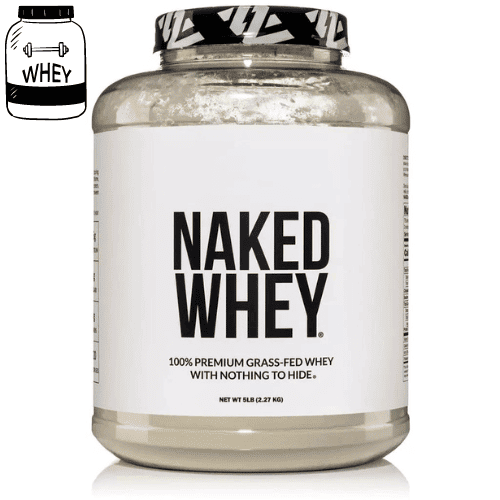
Whey is one of the two main proteins found in milk, the other being casein protein. It’s a watery film left behind by the coagulated milk fat during the production of cheese. It’s also the same substance found in yogurt, giving it its familiar tang and health benefits.
Whey protein is a high-quality protein because it contains important amino acids needed by the body, and is particularly beneficial for increasing the production of new protein for muscle synthesis. These essential amino acids can’t be made by the body and must be obtained from diet or supplementation.
Suitability For Certain Diets
Whey is also low in fat and lactose, making it ideal for those monitoring their fat intake or those sensitive to regular dairy products. However, it’s not suitable for vegans, vegetarians, and those who are on a paleo diet.
Price Point
At $1.00 per serving, whey is one of the more affordable yet highly effective protein sources, making it one of the most sought-after protein powders in the market.
Whey Protein Isolate Database
â Best Whey Protein Isolate Protein Powders
Casein Protein
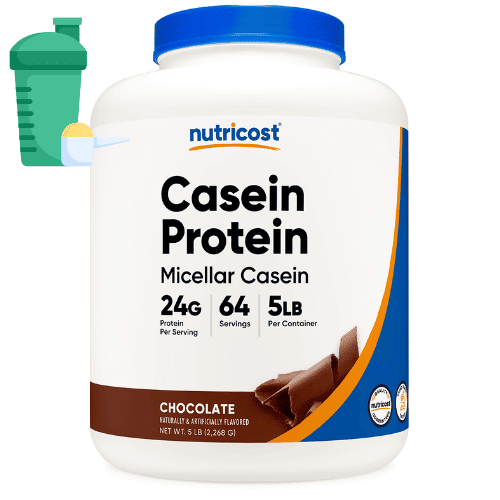
Casein is the most important protein component in milk, both quantitatively and nutritionally, accounting for about 80% of milk’s total nitrogen and is responsible for its white color. It’s a rich source of essential amino acids, making it a high-quality and highly nutritious protein.
Like whey protein, casein protein has a high bioavailability and is a complete source of amino acids and an ideal composition to boot, including high amounts branch chain amino acids (BCAAs), making it an ideal choice for muscle repair, growth, and synthesis.
But what differentiates casein from whey is that it is digested and absorbed more slowly than other types of protein, making it effective in reducing one’s appetite and facilitating muscle recovery, especially when taken right before sleep. Casein protein powder is also richer in calcium than whey and has bioactive peptides that help lower blood pressure.
Suitability For Certain Diets
Since casein comes from milk, it’s not suitable for those who follow a vegan, vegetarian, or paleo diets. Similarly, those with milk allergies should avoid taking casein protein.
Price Point
Casein tends to be more expensive than whey proteins and some plant proteins. Some brands sell $2.00 worth of casein protein powders per serving.
Casein Protein Database
Soy Protein
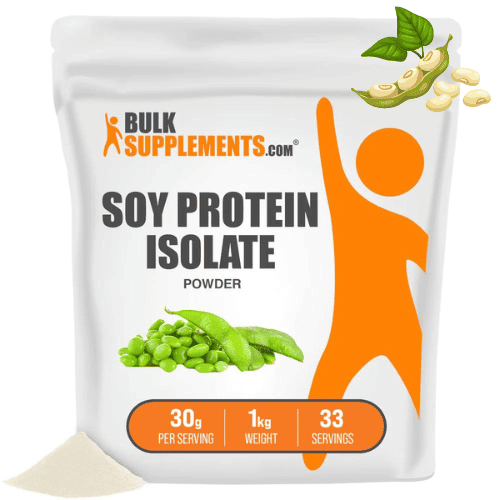
Soy protein comes from soybeans. Compared to other plant proteins, soy has a richer protein content and is one of the few plant-based options to have a complete amino-acid profile. It’s also cheaper than some protein powder types and easy to add to one’s diet.
Soy protein helps with weight loss, building muscle, and gaining energy. It can also help manage hormone balances and lower the risk of breast cancer, cardiovascular problems, and osteoporosis. It also has fiber, which can greatly benefit the digestive system.
Suitability For Certain Diets
Soy protein accommodates more diet types – it’s suitable for vegans and vegetarians and those on keto and paleo diets. However, soy is also an allergen, so it’s not recommendable for those with soy allergies.
Price Point
Soy protein is considered the cheapest kind of protein, with some protein powder brands selling their soy variants at $0.80 per serving.
Soy Protein Database
Pea Protein
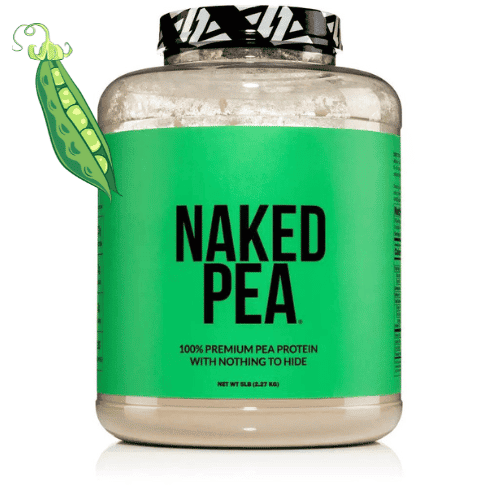
Pea protein is a high-quality protein made from yellow peas and is typically used to increase the protein content of smoothies and shakes. Like soy protein, it’s one of the few plant-based protein sources that contain all nine essential amino acids. Yellow peas are a powerhouse of nutrients providing an abundance of vitamins like vitamins A, B, and C, and minerals like magnesium, calcium, zinc, and potassium.
Pea protein is suitable for almost any diet since it’s naturally vegan and hypoallergenic. It’s also a great source of iron, aids muscle recovery and growth, promotes weight loss, and ensures heart health.
Suitability For Certain Diets
Pea protein can suit almost every diet and is compatible with everyone. However, some pea protein brands contain high amounts of sodium given its extraction process which may not sit well with those who are on a low-sodium diet or those seeking to cut their sodium intake.
Price Point
Pea protein is one of the pricier plant-based protein powder variants, with some brands selling products at $1.66 per serving.
Pea Protein Database
Hemp Protein
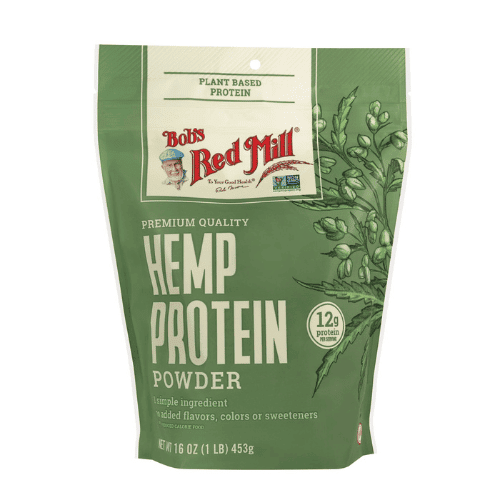
Hemp protein is a vegan, plant-based protein powder that’s made from hemp plants. It’s also a complete protein source like pea and soy proteins. It comes from the cannabis plant but doesn’t contain tetrahydrocannabinol (THC) the psychoactive compound found in marijuana.
Hemp stands out among most protein powders because it’s rich in omega-3 and omega-6 fatty acids which help maintain good cardiovascular health, maintain lean body mass, and promote optimal brain function. It can also lower the risk of cancer, high blood pressure, and high cholesterol.
Suitability For Certain Diets
Hemp is suitable for all diet types and is allergy-free.
Price Point
The popularity of hemp protein is only fairly recent, due to this and its meticulous production process, makes it generally more expensive than other protein powders.
Hemp Protein Database
Rice Protein
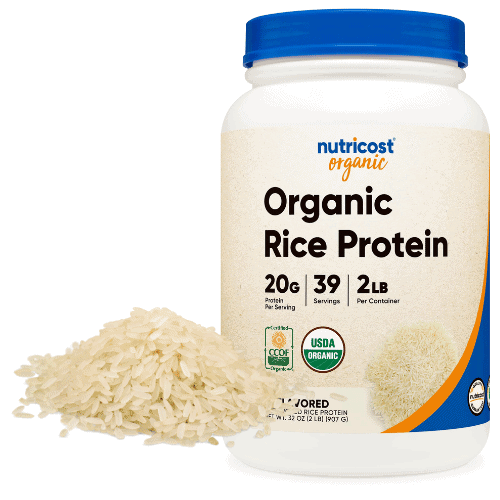
Rice protein is a lesser-known protein isolate made from rice and is often used as an alternative to the more common whey and soy protein isolates since it has about 37% of the total protein and essential amino acids they have. When extracted by alkaline or α-amylase, rice protein can help reduces both cholesterol and triacylglycerol levels in the liver.
However, rice protein is not considered a complete protein since it has low levels of amino acids lysine and threonine, which have to be added to rice protein supplements to fill in the imbalance.
Suitability For Certain Diets
Rice is suitable for all diet types. Since rice is rarely involved in food allergies, rice protein may also be preferred by people with food allergies, and may be suitable to use in hypoallergenic infant formulas.
Price Point
Since rice is a lot easier to harvest, the protein sourced from rice is fairly cheaper than most protein sources since it reflects the lower cost of its production. A rice protein powder can cost about $0.44 per serving.
Rice Protein Database
Egg Protein
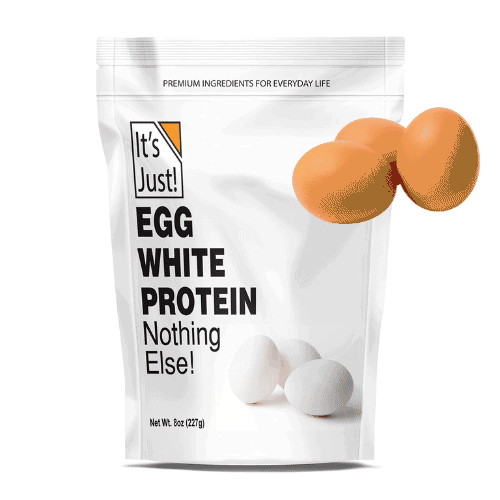
Egg protein, as the name suggests, is sourced from eggs. Both the albumen (egg white) and the yolk contain proteins, but while the yolk has the more significant concentration of protein, the amount of egg white is greater so it provides more. Some protein brands use a combination of both.
Eggs are nutrient-dense and are a complete source of protein having a complete amino acid profile and having between 5.2 and 7.5 grams of protein in an egg, depending on its size. It also has other important antioxidants like lutein and zeaxanthin which protect one’s health.
Suitability For Certain Diets
Being an animal-based protein, egg protein powders are not suited for vegans, vegans, and those with egg allergies. However, they’re both keto and paleo diet-friendly.
Price Point
While eggs are inexpensive and widely available, egg protein powders are more expensive than whey and soy powders, with an average of $1.16 per serving.
Egg Protein Database
Mixed Plant Protein
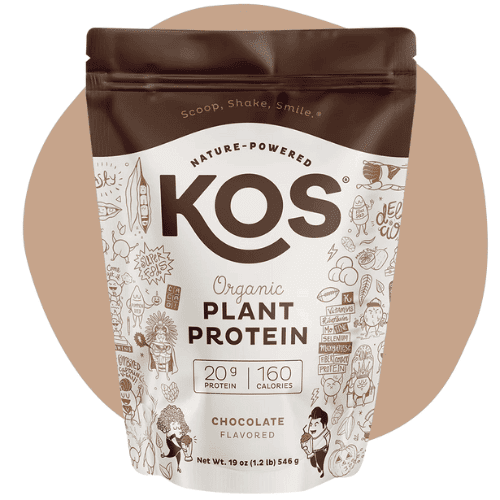
Mixed plant proteins are a blend of various organic/plant-based proteins. Since many plant-based proteins are incomplete protein sources having an incomplete amino acid profile, they are combined in the right proportion to obtain a similar profile of more complete proteins like whey, casein, or soy.
Typical combinations include:
- Pea and rice proteins
- Pea and seed proteins (e.g., chia, pumpkin, sunflower, etc.)
- Pea, rice, and seed proteins
- Pea, rice, and hemp proteins
- Vegetable and rice proteins
- Rice and crop proteins (e.g., quinoa, amaranth, buckwheat, etc.)
Suitability For Certain Diets
Mixed-plant proteins are widely suitable for all diet types and are typically allergen-free.
Price Point
The average price of mixed plant proteins ranges from $1.00 – $1.60 per serving
Plant Protein Database
Collagen Protein
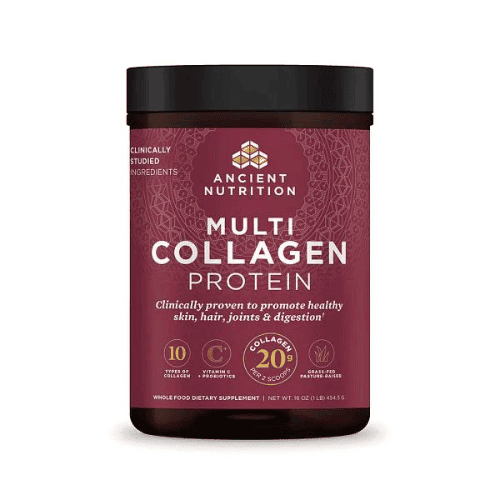
Collagen is the most abundant protein in the human body, found abundantly in humans and all mammals. It’s an important building block in bones, ligaments, tendons, and muscles and plays a big role in your hair, skin, and nail health.
As with all protein structures, collagen is built from amino acids. Collagen contains 19 amino acids and 8 essential amino acids, such as:
- Glycine – Glycine contributes to cellular growth and health and prevents muscles from breaking down by boosting creatine levels in the body. It can also protect the liver from alcohol-induced damage and improve sleep quality.
- Proline – Proline works with other amino acids and vitamin C to form collagen, which is important in building tissues. It’s also integral to wound healing, antioxidative reactions, and immune responses.
- Hydroxyproline – Like proline, hydroxyproline is a major collagen component and contributes to its stability. When used topically, it helps decrease fine lines and wrinkles and is added as an ingredient to anti-aging skincare products to help increase skin penetration.
- Arginine – An amino acid naturally found in red meat, poultry, fish, and dairy, it’s integral in making proteins, is commonly used for circulation, and has been shown to protect the kidney against toxic or ischemic injury.
While taking a collagen supplement offers a trove of health benefits, collagen contains only 8 of the 9 essential amino acids, which the body cannot produce independently. A person needs to get these essential amino acids from outside sources, such as animal products like meats, low-fat dairy, whey, casein powders, and plant-based protein sources.
Suitability For Certain Diets
Collagen supplements are made from animal products like bone broth using pigs, beef, and fish, so they may not be compatible with vegans, vegetarians, religious restrictions, and those with seafood allergies. But they’re suitable and even recommended for paleo and keto diets.
Price Point
Collagen protein powders are generally more expensive, ranging from $1.50 to $2.15 per ounce. But while it’s an effective and promising supplement, it has a poor quality of protein compared to other sources.
Collagen Powder Database
Plant-Based Protein vs Animal-Based Protein
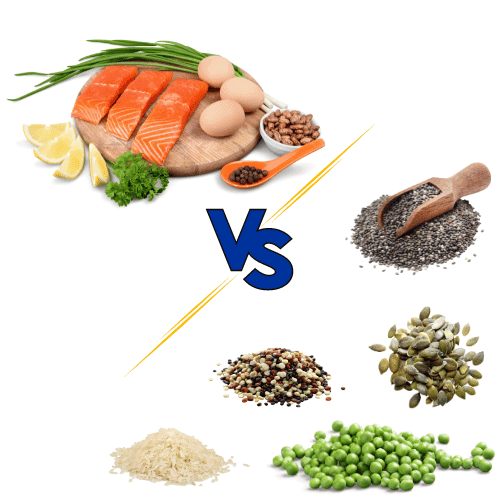
While both highly effect, plant-based and animal-based protein powders tend to vary in the following factorsâ¦
Nutritional Differences
Animal-based proteins contain all nine essential amino acids in equal amounts, while only a few plant-based sources like soy, pea, and hemp have a complete profile. Plant proteins with an incomplete amino acid profile are usually mixed with other plant-based proteins to suffice the amino acids they lack.
On the other hand, plant-based proteins tend to be more allergen-friendly.
Price Points
Animal-based sources of protein like whey, casein, and egg are generally considered cheaper given their wide availability and length of processing.
Most plant-based/vegan protein sources like peas, crop, and hemp are more expensive since they are more difficult to harvest and go through lengthier processing times and extraction methods. However, soy and rice proteins are fairly inexpensive.
Digestibility & Bioavailability
Studies show that animal-based proteins like whey protein have better and faster digestion compared to plant-based proteins like soy protein. Soy, however, is digested faster than casein proteins.
Environmental Impact
Experts agree that plant-based proteins produce fewer greenhouse gas emissions and use less water and land when compared with sourcing and producing animal-based protein products
How to Choose the Right Protein Powder
Here are things you should always consider when shopping for protein powder. Following these factors can ensure better compatibility with a particular product/brand and a more consistent supplementation.
- Protein content – Always choose a protein powder that offers a high protein content per serving. It will help you meet your daily protein goals better, especially if you’re bulking or aiming to gain more muscle.
- Amino acid profile – Make sure that the protein source is a complete protein containing all 9 essential amino acids.
- Taste – Taste is an important factor for consumers when deciding whether they like a product, as it helps the consumer take a liking to the supplement and ensure consistency in consuming and patronizing the brands
- Mixability – Some protein powders tend to clump when mixed or shaken, regardless of the force and temperature of the liquid. Opt for ones that blend/mix easily.
- Personal dietary restrictions (if any) – You may want to avoid certain protein powder types If you’re vegan/vegetarian, lactose intolerant, on a keto diet, or have food allergies. Always check the label for possible allergens.
- Price points – Try to compare price points and see which one suits your budget better or gives more value to your money.
Potential Side Effects of Protein Powders
Taking protein powders is generally safe and recommendable. But misuse and overconsumption can result in the following problems:
- Bloating
- Gas
- Diarrhea
- Increased appetite loss
- Stomach problems
- Unwanted weight gain
Taking protein powder supplements should never substitute for a healthy, balanced diet. A healthy and balanced diet can provide all the proteins and amino acids your body needs and eating a protein-rich diet is still considered the ideal way to meet one’s protein needs/requirements.
Protein powders only serve to increase one’s protein needs according to their health and fitness needs/goals.
Recap
- Proteins are considered the building blocks of life. They play many important roles in the body that help promote bodily functions, particularly regulating tissue growth and regeneration and organ function.
- Amino acids are molecules that combine to form proteins and help break down food, grow and repair body tissue, and make neurotransmitters.
- Protein powders get their protein from animal and plant-based sources, each with varying protein levels, qualities, and health benefits.
Conclusion
Protein powder supplements help you achieve your fitness goals better and faster, whether they’re animal-based or plant-based, these protein sources offer their own unique set of nutrients and benefits which build you up on a clean slate of health.
Always consider your health needs and preferences when choosing a protein powder supplement. That way, they can complement and suit your needs better and more effectively.
Disclaimer: this article does not constitute or replace medical advice. If you have an emergency or a serious medical question, please contact a medical professional or call 911 immediately. To see our full medical disclaimer, visit our Terms of Use page.
Related Articles
â Protein Before Bed – Good or Bad Idea?










